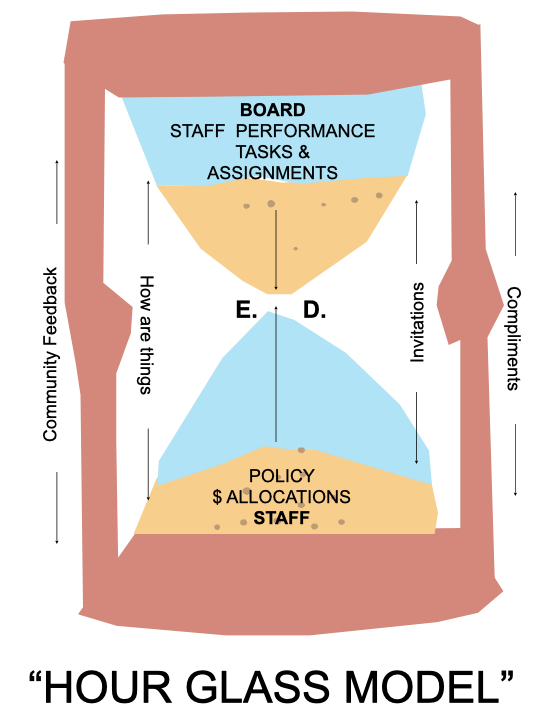
Policy Making vs. Administrative
Board Policy
2 or more commissioners
Confidentiality
Contact with Park District Attorney
Board directs Executive Director or President
Hiring
Executive Director hires/supervisors all others (hour glass)
Distribution of packets
Tracy Johnson is recording secretary and general assistant in Board matters
Executive Director Direct Phone Line
Executive Director Memos: October 2016 to present
Mailboxes
Minutes from Regular Board Meetings
Writing Letters
At the first meeting, you take an oath of office. The Executive Director is also the Board Secretary and administer the oath. All newly elected commissioners get “sworn in” together.
Following your installment, the Board need to elect a president pro tem. The person is elected to chair the meeting during the first order of business, which is to elect a Board president and vice-president. In addition, the Board appoints a Secretary and Treasurer. As is typical with Illinois Park Districts, the Director serves as secretary and the Financial Officer serves as Treasurer. Call me if you’d like more information on the whys and wherefores of Board Officers.
Once a president of the Board is elected, the president presides over the meeting. The president has the responsibility to move the Board through the written agenda. The president recognizes, or not, Board members or other individuals who wish to speak. (See attached rules of order).
State law requires that the Board follow parliamentary procedure. As such, discussion should only follow a motion and a second. The person who made the motion is to speak first. Then, discussion is directed and coordinated by the president. The president controls discussion length.
Most motions require just a voice vote. Ordinances and some resolutions require a roll call vote, where the Commissioner states his/her vote when the secretary call his/her name.
As a basic rule of thumb, only the following topics can be discussed in Closed Session: LAND ACQUISITION (purchase or lease), PERSONNEL (hiring, firing, compensation, evaluation, discipline), and LITIGATION (pending lawsuit). Not only can these topics be discussed in Closed Session; they should only be discussed in Closed Session. Closed session is meant to be confidential and not discussed outside of the meeting.
There is an ongoing question about interaction with audience members. It is optional. Ted Flickinger, Director of the Board’s Illinois Association of Park Districts, informs that the Board is under no obligation to field comments or questions during the action items of a business meeting. In fact, he said it is uncommon. The Listening Post is a vehicle set up before the meeting to gather information from citizens on any topic. Our standard Board procedure is to listen to comments, suggestions, and questions. All questions are answered by Staff within 48 hours.
After the first meeting, the Board seating arrangement probably change. There is nothing magical about the arrangement. If there is a specific place you want to sit, tell the president. Typically, the vice president sits next to the president.
(At your orientation, we go over many other ins and outs of Board protocol, as well as, important items like the Illinois Open Meetings Act).
Audit 2017
C.I.P. Budget
Grants
Levies
Role of Auditor

Ancel Glink New Elected Official Guide – 2017
State Laws
Park District Policies
Open Meeting Act Training
SUE SITE DOWN
http://municipalminute.ancelglink.com/2021/05/open-meetings-act-training-for-members.html
The Open Meetings Act (OMA) requires that all public bodies designate employees, officers or members to receive training on compliance with this law. Each public body must submit the list of designated persons to the Public Access Counselor. Public bodies may submit this information by U.S. Mail or e-mail to:
Sarah Pratt
Public Access Counselor
Office of the Attorney General
500 S. 2nd Street
Springfield, Illinois 62701
OMA Electronic Training OMA Designees must successfully complete the electronic training on an annual basis. When a public body designates an additional employee, officer or member to receive this training, that person must successfully complete the electronic training within 30 days after that designation.
The Public Access Counselor’s Office’s OMA electronic training is available free of charge at:
http://foia.ilattorneygeneral.net/electronic_foia_training.aspx.
Boardmanship
Customer Input & Responsiveness
Executive Directors Goals 2019
Indoor Recreation Study
Land Acquisitio
Management Practice
Master Plan 2018
Operational Policies
Playgrounds
Program Planning and Supervision
Park Rules & Regulations Ordinance 411
Serving on a Park Board Brochure – IAPD
Strategic Plan 2018-2022
Training & Education
Western Trail Link
Adding to Agenda
Associations
Illinois Association of Park Districts (IAPD)
Illinois Park & Recreation Association (IPRA)
National Recreation and Parks Association (NRPA)
Attending Events & Programs
Board as a Unit
Do
Don’t
Public Interaction
Tour
Inter-Governmental Cooperation
????